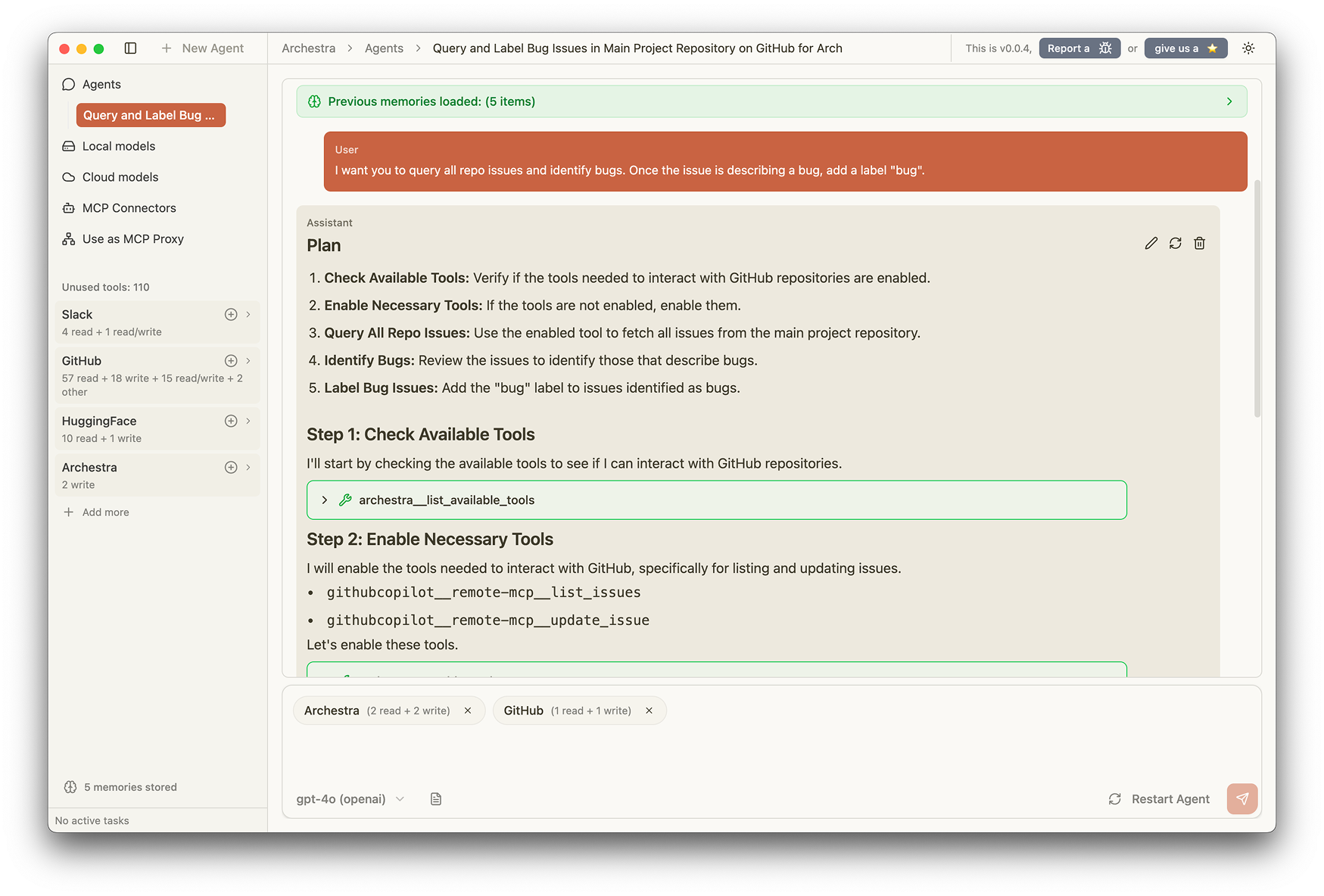Overview

Archestra Desktop Agent is a local AI client that simplifies secure, enterprise-grade AI <-> data interactions through the Model Context Protocol (MCP). It provides a unified interface for both local and cloud-based models, as well as remote and local MCP servers.
Key Features
🔥 Unique Authentication — No need to toss API keys and config files to run MCP!
🔒 Sandboxed MCP Runtime — Isolated sandbox protecting the host from supply chain attacks.
🔌 Full OSS MCPs Support — Compatible with thousands of existing MCP servers.
💻 Local-First Architecture — Privacy-focused design with local LLM.
Architecture Overview
The Archestra Desktop Agent architecture consists of several key components working together to provide a seamless experience:

- ChatGPT-like UI: A familiar, user-friendly interface for interacting with AI models
- MCP Orchestrator: The central hub managing all MCP connections and operations
- Authentication Engine: Handles secure authentication and authorization
- Virtual Machine: Provides isolated execution environments for local MCP servers
- MCP Gateway: Manages connections to local & remote MCP servers
- Archestra MCP Server: Built-in MCP server for dynamic tool management
Component Details
🖥️ ChatGPT-like UI
The user interface is built with modern web technologies to provide a familiar chat experience. It uses React with TanStack Router for navigation, Tailwind CSS for styling, and custom components built on Radix UI primitives. The interface supports multiple chat sessions, real-time streaming responses, and displays tool invocations transparently. It includes features like dark mode, typewriter effects for AI responses, and a sidebar for managing chats and MCP servers.
🎯 MCP Orchestrator
The MCP Orchestrator (implemented as ToolAggregator) is the central coordination layer that manages all MCP connections and tool availability. It combines tools from multiple sources including sandboxed MCP servers and the built-in Archestra MCP server. The orchestrator handles tool discovery, maintains a unified tool registry, and routes tool invocations to the appropriate MCP servers. It ensures tools are properly namespaced to avoid conflicts between different servers.
🔐 Authentication Engine
The Authentication Engine provides secure authentication without exposing API keys or secrets to MCP servers. It features:
- Browser-based authentication for services like Slack and LinkedIn, extracting tokens directly from authenticated browser sessions
- OAuth proxy server that securely handles OAuth flows, adding client secrets server-side while supporting PKCE
- Provider registry system for managing different authentication methods
- Automatic token extraction and refresh mechanisms
🛡️ Virtual Machine (Sandbox)
The Virtual Machine component uses Podman to provide isolated execution environments for MCP servers, protecting the host system from potential security risks. Key features include:
- Podman machine management for running containers in a lightweight VM
- Container isolation with each MCP server running in its own container
- Resource management and monitoring of containerized servers
- Base image system for efficient deployment of MCP servers
- Socket-based communication between the host and containerized services
🔌 MCP Gateway
The MCP Gateway manages connections to both local and remote MCP servers, acting as a bridge between the Archestra client and various MCP implementations. It handles:
- External MCP client integration with tools like Claude Desktop, Cursor, and VS Code
- Configuration management for different MCP client types
- Server discovery and registration
- Connection pooling and lifecycle management
- Protocol translation between different MCP client implementations
🏗️ Archestra MCP Server
The built-in Archestra MCP Server provides essential system management capabilities through a set of powerful tools. It connects via HTTP transport to the local MCP endpoint and offers the following tools:
Memory Management Tools
list_memories- List all stored memory entries with their names and valuesset_memory- Set or update a memory entry with a specific name and value (persists across chat sessions)delete_memory- Delete a specific memory entry by name
Tool Management Tools
list_available_tools- List available MCP servers or tools for a specific serverenable_tools- Enable specific tools for use in the current chatdisable_tools- Disable specific tools from the current chat
These tools enable:
- Persistent memory storage across chat sessions for context retention
- Dynamic tool discovery to explore available capabilities
- Fine-grained control over which tools are accessible in each chat
- Real-time updates via WebSocket for memory synchronization
Releases & Changelog
Available here: https://github.com/archestra-ai/archestra/releases